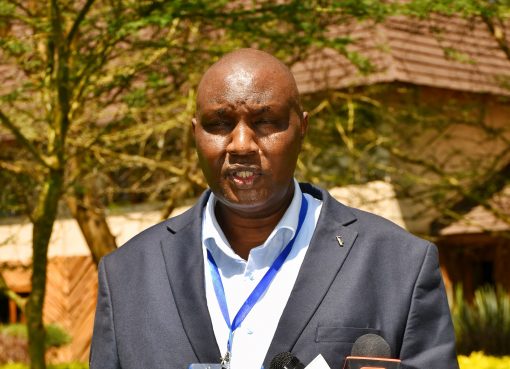The Government has assured citizens that the Maisha Card adheres to international best practices and features enhanced security measures.
Nakuru County Commissioner Loyford Kibaara praised the card for its compliance with the International Civil Aviation Organisation (ICAO) standards, which is crucial for cross-border identification.
In addition to improved security features that make the card resistant to forgery and tampering, the administrator indicated that the Maisha Card introduces a digital version of the National ID.
Speaking at his boardroom when he chaired a meeting of Deputy County Commissioners, Registrar of Persons and Civil Registrars from the 11 Sub-Counties ahead of a planned public and stakeholder participation forum on the draft regulations for the Registration of Persons Amendment Rules 2024 and the Birth and Death Registration Amendment Rules 2024,
Mr Kibaara explained that the card consolidates several existing databases into a master national register, eliminating the need for multiple separate registration records.
The Registration of Persons Amendment Rules 2024 and the Birth and Death Registration Amendment Rules 2024 are critical in anchoring the rollout of the Maisha Card and its related features, including the virtual ID that the government has been piloting since November last year.
Mr Kibaara said the government was aiming at extensive and interactive forums to enrich the draft regulations.
“The Maisha ecosystem complies with regional and international best practices on the standardization of essential features of personal registration documents including the National ID Card. The introduction of the Maisha Card was preceded by extensive consultations, involving over 820 public and stakeholder engagements with civil society, religious leaders, the private sector, the media and the public,” noted the administrator.
The Maisha Card, along with its supporting infrastructure such as the Maisha Number, digital ID and the Maisha Database, was introduced in November 2023.
The card includes a machine-readable microchip designed to enhance security and contains personal details. Similar to ATM cards, the microchip has a maximum shelf life of ten years from the date of issuance.
Since its launch, the National Registration Bureau (NRB) has issued 972,630 Maisha Cards, including 531,329 new applications and 441,301 duplicates.
Mr Kibaara mentioned that when the card is renewed after ten years, applicants will not need to undergo fresh biometric data collection.
The County Commissioner however, clarified that the expiry of a Maisha Card will not amount to a loss of citizenship, with the bearer only required to renew the document.
However, they will need to provide updated passport-sized photos to account for potential changes in facial features.
The County Commissioner elaborated that renewal of the cards was necessary because the microchips in the cards “Just like in other documents such as ATM cards” has a shelf life of a decade from the date of issuance.
Mr Kibaara stated that renewal is a standard practice in countries such as Uganda, Tanzania, Nigeria, Senegal and France among others which have implemented an ID with a microchip.
He added “The International requirement by the International Civil Aviation Organization (ICAO) is that all our documents, identity documents need to have an expiry date in it, including the driving license, and the passport. All these documents have a duration, we are using the template of international standard,”
Immigration and Citizen Services Principal Secretary Julius Bitok has since announced that the National Registration Bureau (NRB) has upgraded its printing capacity with a new modern printer, now capable of producing 30,000 National ID Cards daily, exceeding the average demand of 10,000 applications.
Mr Kibaara assured the public that their feedback on the draft regulations will be taken seriously as the government hopes to avoid the pitfalls that have dogged previous attempts to introduce new ID cards in the country.
“Public participation is not merely a procedural obligation but a fundamental aspect of our democratic system. It presents a unique opportunity to dispel misconceptions about Maisha Namba and Maisha Card, ensuring that citizens grasp the benefits and scope of these initiatives,” he said.
“Maisha card is the Third Generation Identification Number, which carries Maisha Namba. All Kenyans turning 18 years in whichever part of Kenya will be issued with a Maisha card on a pilot basis. This way, we will establish whether there are any errors or issues before we do the penultimate launch. Maisha integrated database will help the government to monitor the data of all immigrants, refugees because their data will be integrated to their government,” the administrator elaborated.
The Maisha cards will also be given to those seeking replacement for defaced or lost cards. The County Commissioner further noted that the government plans to address challenges that could be encountered.
Maisha card is designed to feature a microprocessor electronic chip with encrypted data to enhance security and address forgery issues.
It will also enjoy features supporting the creation of a virtual ID to be known as Maisha Digital ID for smartphone users.
The card will feature a unique personal identifier (UPI) number known as Maisha Namba which will be the primary and lifelong registration and identification reference for its holders.
Newborns will be issued with Maisha Namba to use in their birth certificates and other government services, which will later translate to Maisha card after turning 18.
“All newborns and individuals registering for IDs for the first time will be issued a lifetime Maisha Namba, which will serve as their registration number for school, NHIF, KRA, and other government services,” Mr Kibaara added.
“During the rollout of the Huduma number, all Kenyans were asked to register afresh. For Maisha Namba, the State is neither harvesting biometrics nor is it asking for additional money. The Government is using the existing budget for the registration of persons for the Maisha Namba ecosystem rollout,” said Mr Kibaara.
The Maisha Namba, Maisha Card, and Maisha Digital ID will be consolidated into a population register known as the Maisha Integrated Database.
He affirmed that obtaining the Maisha namba will be voluntary, with the government relying on the card’s advanced features to encourage adoption.
The County Commissioner assured Kenyans that the current ID (second generation) remains a valid registration document but indicated that the new Maisha cards will offer enhanced technological features that support digital identification.
The public sensitization and participation exercise will engage representatives from civil societies, the private sector, religious leaders and development partners and will be an ongoing exercise that will continue even after the official launch.
By Anne Mwale




